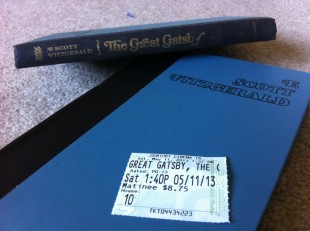Sparkling champagne, big parties, reckless behavior and extravagant wealth. The Roaring 20s were a time of splendor, with rocketing stock prices, glittering jazz and bootleg alcohol. In the midst of the careless decade comes “The Great Gatsby,” a masterful novel by F. Scott Fitzgerald about a war veteran who goes to great lengths to win back his past love.
First off, we’d like to give director Baz Luhrmann a pat on the back for embarking on the ambitious journey in trying to take on arguably the greatest American novel of all time. In the past, other directors, Jack Clayton for one, attempted to recreate F. Scott Fitzgerald’s masterpiece with mediocre results. It seemed nobody could capture the grandeur and poetry of “The Great Gatsby,” and so some credit must be given to Luhrmann in his attempt to conquer such a seemingly impossible task. That being said, Luhrmann’s rendition of “The Great Gatsby” does not quite seem to pierce the heart of the novel. It comes so, so close, but in the end, the swooping shots of the New York City skyline, the writhing masses of colorful party-goers and the not-quite-poetic narration fail to capture the majesty of Fitzgerald’s timeless novel.

Let’s start with the positives. For one thing, the casting was absolutely spot-on. Carey Mulligan (“Pride & Prejudice”) is a perfectly charming, alluring, ‘golden girl’ Daisy, while Joel Edgerton (“Zero Dark Thirty”) portrays the brutal, careless Tom as one of the most unlikable characters in movie history. And, of course, the always-sparkling Leonardo DiCaprio (“Inception”) portrays tragically reminiscent Jay Gatsby, bubbling over with the charm of “Titanic”‘s Jack a decade and a half prior. The weakest link in the cast was regrettably Toby Macguire (“Seabiscuit”), who played Nick Carraway with a bit too many dramatic pauses for our taste. One gets the sense that Macguire, now 37, is too old to correctly portray Carraway as the naive, wide-eyed bonds salesman-turned-writer the novel casts him to be.
Another solid triumph of Luhrmann’s “Gatsby” came in his gaudy interpretation of the twenties, illustrated by flying shots of New York’s skyline, colorful, extravagant party scenes that dominated the screen with feathers and dancing bodies and the pumping of the modern soundtrack featuring artists such as Jay-Z and the xx. Although at first we were hesitant to accept these more contemporary aspects into the traditional view of the twenties, we quickly found that the modern touches actually help bring the characters to life and relate the over-the-top parties of the prohibition era to the pumping clubs of today.
Regrettably, Luhrmann failed to translate the soft, gentle poetry of Fitzgerald’s novel with the same brilliance as he portrayed the extravagance of the twenties. With fading shots of mist on the bay and words floating from Nick’s typewriter onto the screen, it was clear that the elegance of Fitzgerald’s prose was not forgotten, yet the movie failed to treat the hopes and dreams of each character (Gatsby especially) with the same gentle grace the book had so skillfully yielded. Quite honestly, the passages of the book inserted into the movie seemed painfully forced and unnatural, the complete opposite of their original fluid, natural poetry.
Yes, this movie made us cry (and not from disappointment), yet it failed to stay with us after we stepped out of the theatre and into the late afternoon sun. The dazzling effects of the film were visually entertaining, but detracted from the vibrant plot. Luhrmann’s rendition of the timeless classic came so painfully close to capturing the essence of Fitzgerald’s novel, yet fell short of the sad, haunting beauty that Gatby’s tale should have created.
So is this movie good? Yes. Very, very good. But is it great? Almost. Almost, but not quite. But, regrettably, “The ‘Alright’ Gatsby” just doesn’t have the same ring to it.

